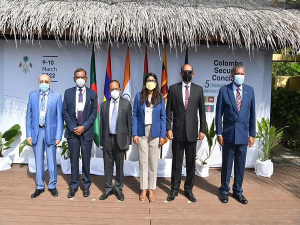In early March, the Colombo Security Conclave (CSC), a grouping of India, Sri Lanka, Maldives, and Mauritius, adopted a road map for cooperation and collaboration in areas such as maritime security, counterterrorism, and drug trafficking in the Indian Ocean.
Mauritius was added as a new member in the grouping during the meeting, which was also attended by Bangladesh and Seychelles as observers. Bangladesh is speculated to be next full-fledged member in the group. Mauritius’ elevation in the group has also confirmed the wide-held belief that the CSC is becoming institutionalized.
The CSC has potential to succeed but it risks being splintered if India focuses on creating an anti-China group. Even though the strategic interests of the six countries are aligned in the Indian Ocean Region (IOR), an attempt to mold the CSC into an institution to counter China’s influence would meet the fate of the South Asian Association of Regional Cooperation (SAARC), widely regarded as a failure. A simple metric for the CSC’s success would avoiding the reasons for SAARC’s failures by keeping bilateral issues from affecting decisions in the subregional grouping. In SAARC’s case, it was the bilateral issues between India and Pakistan that diminished the efficacy of the organization. In the CSC’s case it might be the tension between India and China, which could be reflected in the institution. India, which has a contentious border dispute with China, has a different stance toward Beijing than its oceanic neighbors, many of whom enjoy warm ties with China.
That was the thrust of an opinion piece published in August 2021 by Chinese-based news outlet the Global Times. The article warned Indian Ocean countries to be “wary of the expansion of the Colombo Security Conclave” which Global Times described as “a mechanism that might become a trap set by India to maintain its dominance in the region and realize its geopolitical ambitions.”
Unlike the previous meeting in 2021, the recent CSC meeting has not received criticism in China. In fact, it has been underreported, perhaps because the CSC this time wisely focused on other issues.
The fifth meeting of national security advisers of the CSC, which was held in Maldives, identified five broad areas of cooperation to strengthen regional security. The five pillars of cooperation are maritime safety and security, countering terrorism and radicalization, combating trafficking and transnational organized crime, cybersecurity, protection of critical infrastructure and technology, and humanitarian assistance and disaster relief.
It is too early to tell whether the organization has succeeded, but it is gaining traction. For example, the first CSC-focused operation was conducted between the lead maritime security agencies of India, Maldives, and Sri Lanka in November 2021. Ships and aircraft from the Indian Navy, Maldives National Defense Force, and Sri Lankan Navy participated and operated over a vast area in the Exclusive Economic Zones (EEZs) of the three countries in the southern Arabian Sea.
For the institution to succeed, India should concentrate on extending its capability to provide bilateral assistance to its neighbors in a regional setting. India has a proven track record in providing humanitarian aid. Maldives President Ibrahim Solih recently acknowledged India’s efforts by thanking the country for donating COVID-19 vaccines and providing financial assistance to Maldives during the last two years of the pandemic. This is much needed affirmation from Maldives of India’s importance especially when the “India Out” campaign is being peddled by former Maldives President Abdulla Yameen and his cronies. There are also allegations that China may be involved in the campaign.
India has strong bilateral partnerships with the five other CSC participants, but this grouping will foster greater regional cooperation if it focuses on non-traditional security.
To avoid points of contention with its neighbors, India should start to accept that the IOR is developing into a “global commons.” New Delhi has long regarded the IOR to be its sphere of influence and has been critical of other major powers attempting to have a presence there, either by building a naval base or exerting influence via a proxy in the region. According to Indian strategists, this would undermine India’s security by eroding its power to protect Sea Lines of Communications (SLOC) and key choke points connecting its trade routes.
Unsurprisingly, India’s “backyard” has been already encroached upon. Over the past decade, China has emerged as a strong partner for the islands and littoral countries of the Indian Ocean. The Belt and Road Initiative has provided an added platform to collaborate on economic and military issues, especially for Sri Lanka and Maldives. China also has a military base in Djibouti and oversees management of Gwadar port in Pakistan and Hambantota port in Sri Lanka. As such, India should adopt a more accommodating approach to deal with changing dynamics in the IOR. This would also squash doubts that the country is seeking hegemony in the region.
There is an immense need for cooperation in the IOR given the rising number of security issues and uncertainties. The CSC is more likely to succeed if it maintains a common strategic vision and does not get bogged down on the growing Chinese influence in the region. Countries such as Sri Lanka and Maldives, which are more poised to balance between India and China, will not risk converting the CSC into India’s coalition against China.

































